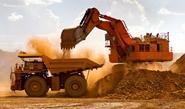Prices

July 28, 2016
Cliffs Natural Resources’ Best Days Still Ahead
Written by Brett Linton
Cliffs Natural Resources recorded another successful quarter with net income of $30 million for continuing operations compared to a net loss of $38 million in Q2 2015. Adjusted EBITDA was $102 million, driven by higher domestic steel prices. EBITDA included idle expenses of $20 million for the Northshore and United Taconite mines.
US iron ore volume was 4.1 million long tons with sales revenue of $361.7 million. Another 5.5 million long tons will be shipped in third quarter and 6.6 million in fourth quarter. Liquidity at the end of the quarter was $421 million, more than 100 million than Q1.
Cliffs CEO Lourenco Goncalves praised the removal of leadership at iron ore executives in Australia and the move toward “sanity in the seaborne iron ore market.” Goncalves mentioned the head of iron ore, Andrew Harding, at Rio Tinto who said, “At the end of the day, what the customer really wants is lower prices.”
Goncalves said, “Such logic may be correct if we were a used car salesman, but it does not apply to a complex multinational supply chain such as iron ore miners, the steelmakers, downstream steel users in which everyone knows everything in real-time including the transaction prices.”
The U.S AD/CVD trade cases were “rock solid and airtight” and confirmed that lower steel prices from foreign sources are a result of dumping not cost efficiency, said Goncalves. Attempts to circumvent duties through transshipment will result in further action by the U.S., he added. The success of trade cases have resulted in a rise in domestic steel prices this year which is “indicative of what a level playing field can do for customers, the steel mills, and for Cliffs.”
Said Goncalves, “But there is a big differential between the price of steel in the United States and the price of steel in China, and so what? What’s the reason why those prices are so low in China? Is it because the Chinese are more competent or more efficient than the American mills? Of course not. It’s a combination of subsidies, artificial lower ore prices, more iron ore into their market than they should be receiving, all these things altogether. Once we correct the cause, the effect is predictable and it’s not to make the mills in China more efficient, it’s just making the mills producing less and that will fix their problem over there and their price will increase not ours will decrease.”
“Of course 2016 and 2017 market prices for steel in the United States will fluctuate up and down in sync with demand. The way a mature market should behave,” said Goncalves.
United Taconite was restarted in May as a result of pellet agreement with US Steel Canada. USSC prefers the quality of Cliffs pellets to those previously supplied by former parent company US Steel, said Goncalves. He hopes that the CCAA process will be resolved soon and that the Canadian steel mill will be independent. Should the process be resolved by US Steel reclaiming the assets, Goncalves said any loss of supply will not mean much because Cliffs has alternative clients.
The new 10 year agreement with ArcelorMittal USA establishes a minimum annual purchase requirement of 7 million long tons which is higher than the two current contracts combined. Cliffs is working on producing a specialized superflux pellet at United Taconite, called the Mustang Project, for ArcelorMittal. Ground breaking is scheduled at United Taconite next month to build a storage facility, new silos and a limestone crusher, and new conveyors. Mustang pellets are on track for delivery to ArcelorMittal when the shipping season starts next year.
“While we take very seriously our permission to operate in Minnesota, others have not. We saw this firsthand hand just recently with another one of our so-called competitors Essar Minnesota, also known as Neverland—never finished, never producing pellets, never paying anyone.”
The company is excited about the arrangement with Minnesota Gov. Mark Dayton for the Nashwauk mineral lease rights. As soon as Essar vacates the premise, Cliffs will take over the lease, said Goncalves. A DRI facility is on Cliffs’ to-do-list.
“We are totally committed with supplying the EAF side of the business here in United States. This being said, our preferred bet is to do it in Nashwauk So, it’s not like we got delayed, it was part of our plan, we knew that Essar would file for bankruptcy. That’s their MO, that’s what they do for a living. They file for bankruptcy and try to get the assets free and clear, not paying their bills. That’s what they – how they operate,” said Goncalves.
Early in the call Goncalves succinctly stated the current condition of Cliffs Natural Resources:
• First, yes, we won. All the problems we encountered here two years ago have been resolved.
• Second, we knew we would win.
• Third, we are just getting started.
• Fourth, Cliffs’ best days are still ahead of us.







